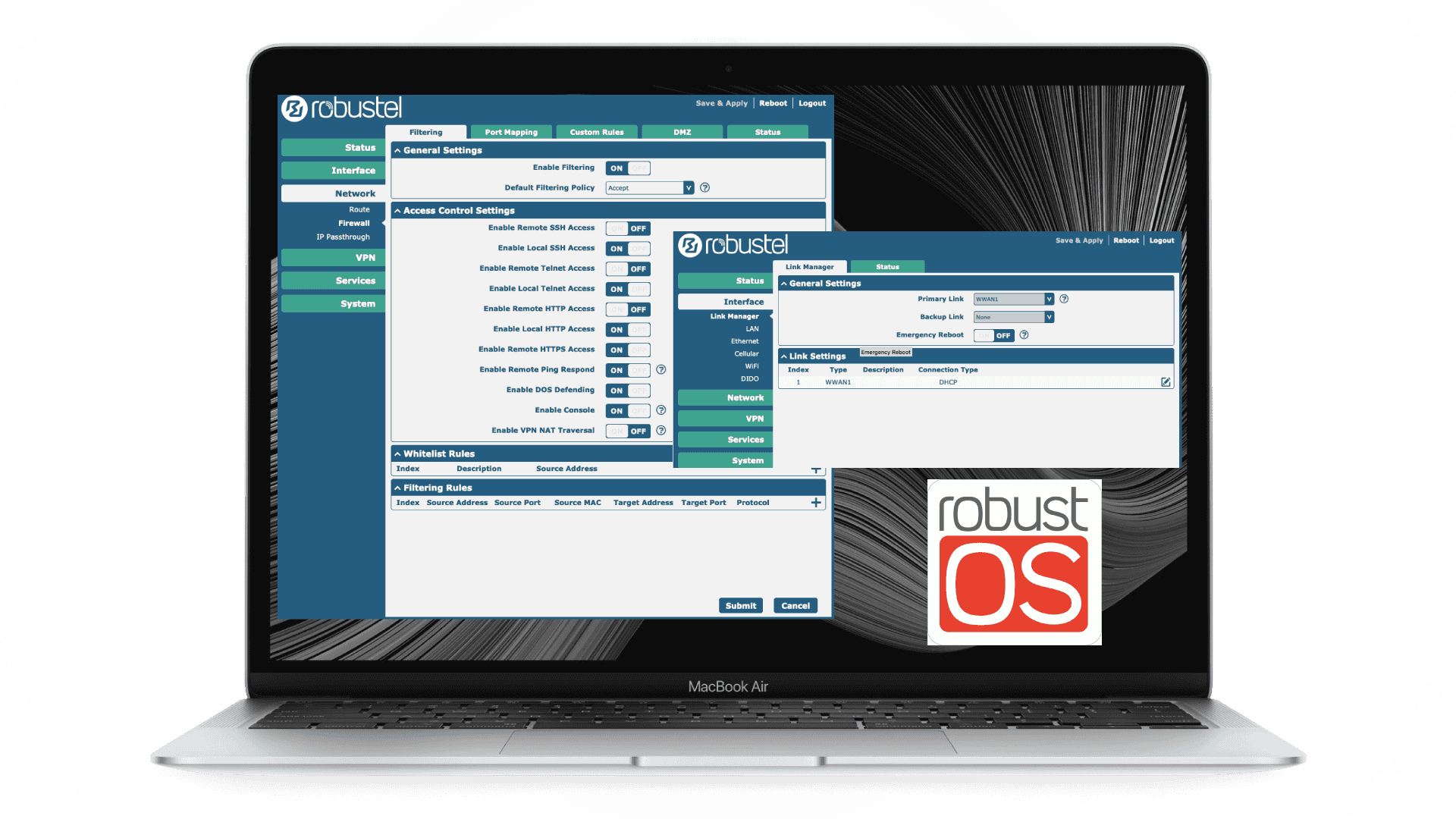RobustOS
RobustOS is Robustel’s proprietary router operating system.
RobustOS is the secure, Linux-kernel–based operating system that powers Robustel routers and modems. It is built for real-world deployments: strong security, resilient networking, and the ability to manage everything at fleet scale through RCMS. It helps teams move from pilot to production with confidence.
Not sure what IoT Operating System is right for your business, click the button below to speak to a Robustel product specialist today

An IoT Operating System Built For People Who Run Critical Networks
Operations Leaders

Configure and troubleshoot directly on the device with a clear Web Manager, consistent menus, and fast local diagnostics. When you choose to connect to the cloud, the same workflows mirror in RCMS so your local habits scale without retraining.
Network Engineers

Get the tools you expect: firewall, IPsec, OpenVPN, WireGuard, VRRP, GRE, QoS, SNMP, and precise link control. Build deterministic networks using a consistent WebUI and a scriptable CLI that behaves the same in lab and field.
Developers & Integrators

Use the RobustOS SDK to build C and C++ apps that integrate into the on-device Web Manager and system services. Manage and update your apps locally first; connect to RCMS when you want the same control and visibility at scale.
Why Teams Choose RobustOS
Security first
Set firewall rules, certificates, and VPNs directly on the device so access is controlled at the edge. Regular security updates, core package refreshes, and independent penetration testing keep the OS itself hardened, giving you confidence before you even apply your own policies. If you later connect to RCMS, the same policies and update cadence can be mirrored across fleets without changing your workflow.
IoT Network Resilience
Define primary and backup links on the device with VRRP, link policies, and granular health checks so sites stay online through real world faults. Shape traffic with QoS and keep sensitive paths predictable even under load. When scale matters, RCMS can apply the same link strategy and watch behavior across many locations.
Edge Protocol Bridging
Run basic protocol translation at the network edge so common industrial data can move cleanly between devices and IP networks. For example, map Modbus registers to readable tags and forward them to your chosen upstream systems without extra hardware. If you connect to RCMS later, you can standardize these mappings and monitor status across many sites, and for broader protocol coverage you can add Edge2Cloud applications.
Device Fleet Operations at Scale
Start with local setup, reusable templates, and profile export and import so each site is fast and consistent. Keep a known good configuration on hand and roll back in seconds if plans change. If you need central control later, RCMS can push those same profiles and firmware in batches.
Proven Longevity
Plan with confidence using documented releases and long term firmware options that keep field assets stable. The WebUI and CLI stay consistent so teams can manage devices years after deployment. When you want extra control, RCMS adds scheduled upgrades and version tracking without changing your local process.
Take your Local Workflow to the Cloud
Everything you do on the device can be mirrored in RCMS with the same menus and logic. Schedule upgrades, push configurations, monitor health, and run diagnostics across one site or thousands without changing how you work locally.
Secure Inside & Out
RobustOS ships with a hardened networking stack designed for enterprise and OT realities. You control access at the edge with policies and encryption, while Robustel hardens the platform with regular security updates, core package refreshes, and independent penetration testing.
Secure on the Inside (your controls)
Set, verify, and maintain security directly on the device with tools that are easy to understand and fast to operate. When you choose, the same practices can be mirrored at scale without changing how you work.
- Consistent Web Manager and CLI so policies are applied the same way across models.
- VPN options: IPsec, OpenVPN, and WireGuard, plus GRE for overlay scenarios.
- Firewall rules, routing controls, and IP Passthrough for clean network design.
- Certificate and key management, HTTPS and SSH access control, and detailed logs for audit.
Verified on the outside (our assurance)
Your team secures the deployment; we secure the operating system that underpins it. Robustel maintains an ongoing program of penetration testing and structured updates to core components, and publishes release details so you can plan with confidence.
- Industry security certifications and guidance centralized for easy reference.
- Independent penetration testing on RobustOS releases.
- Regular security updates and core package refreshes.
- Firmware release cadence with clear notes and version tracking.
RobustOS or RobustOS Pro?
RobustOS is the standard OS for our routers and modems. It provides secure networking, fleet management, and an SDK for extendability. RobustOS Pro is a separate Linux Debian–based environment for industrial computing and containerized applications. Choose RobustOS for networking control and fleet operations; choose RobustOS Pro when you need edge compute and container orchestration alongside routing.
Redefining IoT Network Resilience
RobustOS is engineered for link diversity and predictable failover so remote locations stay reachable. You can shape traffic, switch paths, and verify health locally through the Web Manager or CLI, with device-led Smart Roaming optimizing cellular paths when conditions change.
Resilience Highlights
- Redundancy that behaves: VRRP for gateway resilience and Link Manager policies to define primary and backup paths across cellular, Ethernet, and WiFi.
- Cellular you can steer: Smart Roaming lets you survey networks, set operator preferences and thresholds, and steer connections on the device, including dual SIM strategies where supported.
- Deterministic failover: Fast health checks and millisecond level ping tests move cleanly to the best available link when conditions change.
- Overlay options: GRE tunnels and policy routing support simple branch interconnect and selective backhaul when needed.
- Traffic you can trust: QoS and shaping keep critical applications predictable even when bandwidth is tight.
- Fix faster: Local logs, packet capture, and interface diagnostics reduce site visits and speed root cause analysis.
- Scale when ready: If you adopt RCMS later, you can push the same policies and watch performance trends across fleets without changing how you work locally
Control the Edge – Interfaces, I/O and Protocols
RobustOS gives precise local control of Ethernet, cellular, WiFi, serial, DI/DO, GPS, and more from a consistent Web Manager and scriptable CLI. It also supports basic industrial protocol translation at the edge so common data can move cleanly between field devices and IP networks.
Device Control Highlights
- Physical interfaces: Configure Ethernet roles, cellular profiles, WiFi client or AP modes, and multi-port behaviors directly on the device.
- Serial and I/O: Set RS-232 or RS-485 parameters, map DI/DO events to actions, and use GPS data in policies or logs.
- Protocol bridging: Use Modbus RTU/TCP as a gateway example to map registers into readable tags and forward to upstream systems without extra hardware.
- Serial-to-IP flows: Bridge legacy serial traffic into IP networks with clear rules and monitoring so old and new equipment can coexist.
- Data forwarding: Push selected values upstream using standard methods so control rooms and applications receive only what they need.
- Repeatable installs: Export known good profiles and apply them on site for consistent results; RCMS can standardize these mappings later at fleet scale.
- Broader coverage when needed: For wider southbound and northbound protocol options, you can add Edge2Cloud applications while keeping your on-device setup intact.
Work with IoT Experts who Respect your Industry Knowledge
You know your industry best. We bring deep expertise in IoT device development and deployment, turning your goals into stable designs, repeatable profiles, and smooth rollouts. Together we build a long term partnership that supports scale, growth, and efficiency.
Additional Information
Below are common RobustOS apps used in real deployments and common questions asked when evaluating RobustOS.
Availability of Applications can vary by device and firmware; see release notes for specifics.
